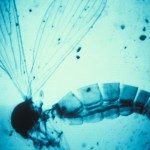Présentation
The field of insect immunity has been largely dominated by studies on antimicrobial immunity, while antiviral immunity received relatively little attention. The discovery of RNAi as an antiviral mechanism, first in plants and later in nematodes and insects, launched a new phase in studying host-pathogen relationships and immunity. This new “nucleic-acid based” immune system awaits to be unravelled. Based on a combination of basic science and bioinformatic approaches, we intend to make key contributions offering new perspectives on viral infection and transmission, and inspiring a new way of thinking about immunity.
During the Starting Grant we addressed the mechanisms that mediate the RNAi-based antiviral response in insects. By combining biochemical, cellular, molecular and genomic approaches, both in vivo and in cell culture, we analyzed the mechanisms underlying viral tropism, systemic propagation of the antiviral signal and the basis of the persistence of the antiviral state. Furthermore, we examine whether the dsRNA-uptake pathway is conserved in mosquitoes and its relationship with viral immunity in that host.




